The products and services mentioned below were selected independent of sales and advertising. However, Simplemost may receive a small commission from the purchase of any products or services through an affiliate link to the retailer's website.
With just 25 calories and six carbs, a medium-sized carrot packs a nutritional punch. One carrot provides more than twice the daily requirement of vitamin A, and the veggies are also loaded with beta-carotene. Along with traditional orange, carrots can also be white, yellow, red or purple. They can be boiled, fried, roasted or steamed; served in salads, soups or stews; mashed for consumption by babies or pets; you can even use them in baked treats. But do you have to peel carrots before you cook or eat them?
The answer depends on several factors, including your personal preference and how you will use them. There are situations when you don’t need to scrape off the vegetable’s skin at all, and then there are instances when it might be best to do so. Learn about when you can skip the peeling and when you might want to go ahead and strip your carrots.
Do You Have to Peel Carrots When Snacking?
Did your grandmother ever tell you that more of the nutrients of carrots are in the skin? While that isn’t exactly accurate, there might be some benefit to eating raw carrots without peeling them. According to researchers from Tuft University’s Gerald J. and Dorothy R. Friedman School of Nutrition Science and Policy, removing the peel does reduce the amount of phytonutrients and some vitamins and minerals — but leaves plenty of nutrition behind.
However, scrubbing off the outer layers of skin has the same effect. Carrot skin can have a bitter taste, so some people prefer to peel them before crunching away. Of course, it is essential to clean them well before eating, whether you peel them or not.

Do You Have to Peel Carrots When Juicing?
You don’t have to peel carrots before juicing them. This is especially true if you use a masticating juicer, which essentially chews up the carrots to produce juice and is better at doing so than centrifugal juicers. Of course, the skin often has some dirt embedded in it, so a good scrub under running water is essential.
Unpeeled carrots result in juice with a slightly brown tint; peeled carrots provide sweeter juice. Ultimately, the correct answer depends on your personal preference. Either way, it is good to use organic carrots and drink the juice right away, as the nutrients will deteriorate when they come into contact with the air.
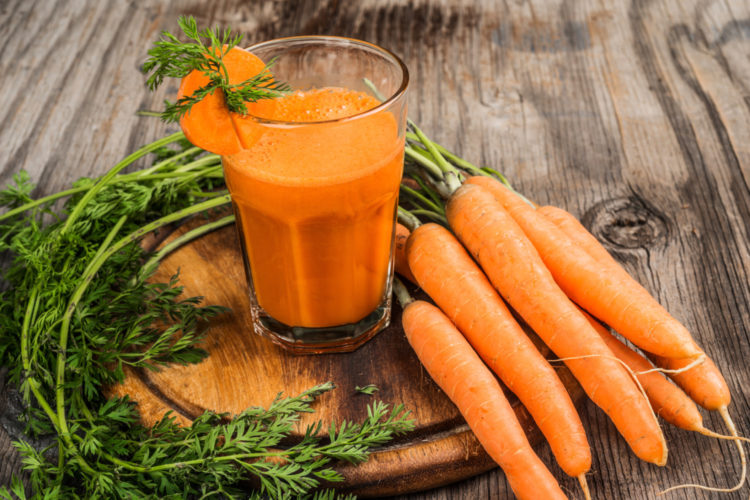
Do You Have to Peel Carrots When Roasting?
Another instance when you don’t have to peel carrots is when you are roasting them. In fact, skipping this step could improve the appearance of the dish.
“If you are making a rustic dish, then leaving the peel on could potentially enhance the look and experience of the dish,” Alan Hilowitz, communications director at Bolthouse Farms, told Better Homes & Gardens.
However, if flavor is more of a priority, you might want to peel them anyway. In a taste test by Cook’s Illustrated, carrot tasters unanimously preferred peel-free roasted carrots both in terms of appearance and flavor. They thought that the unpeeled carrots were tough and wrinkled-looking and tasted more bitter.
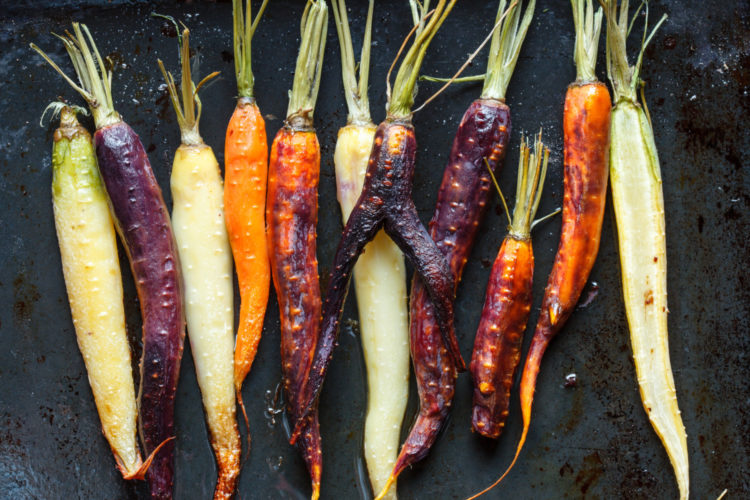
Do You Have to Peel Carrots When Puréeing?
The purpose of the purée can help determine whether you should peel the carrots first. For instance, if you are making homemade baby food, peeling carrots first can have several advantages. First, peeling decreases pesticide residue, which is especially important if the veggies are not organic. Second, unpeeled fruits and vegetables in general can present a choking hazard if large pieces remain in the baby food and can upset a baby’s sensitive tummy. Finally, unpeeled puréed carrots will retain that slightly earthy taste — not necessarily desirable if you’re looking to get a child to accept new foods.
Are you puréeing to make some soup? A vigorous scrub with a stiff vegetable brush to remove any dirt will do the job.
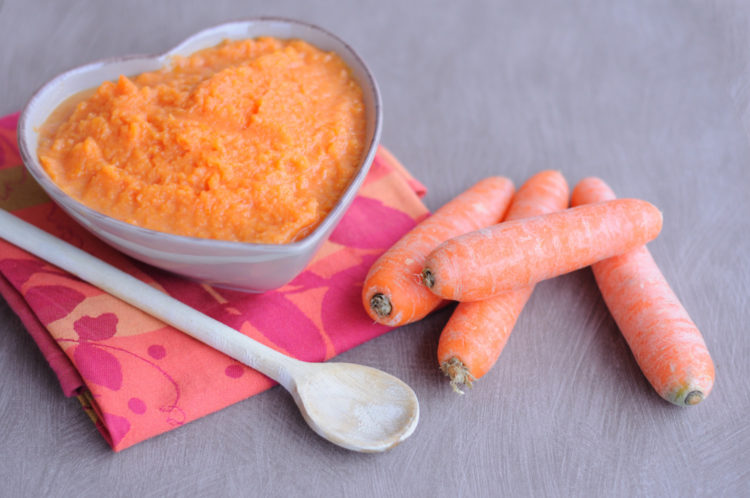
Do You Have to Peel Carrots When Making Broth?
When adding chopped carrots to a pot of water to make a stock, broth or sauce that you will strain before using, you can bypass the veggie peeler. Once you have finished simmering your dish, the carrots often get strained out anyway. Other flavors, like chicken or beef or tomato, will mask any remaining bitterness.
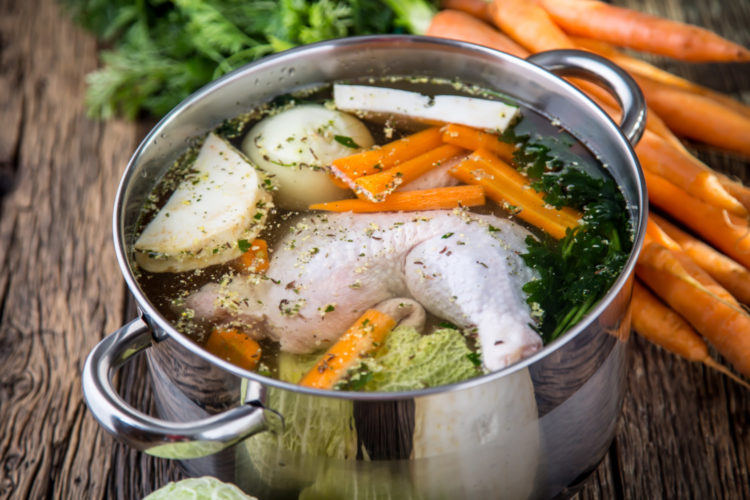
Do You Have to Peel Carrots When Pickling?
If you are making pickled carrots or canning carrots, you don’t necessarily have to peel them. This is particularly true if you use young summer carrots, which have thin, mild skin that is mostly scrubbed away when you clean the vegetables. However, peeling root veggies such as carrots removes bacteria that could eventually render the preserving method ineffective.
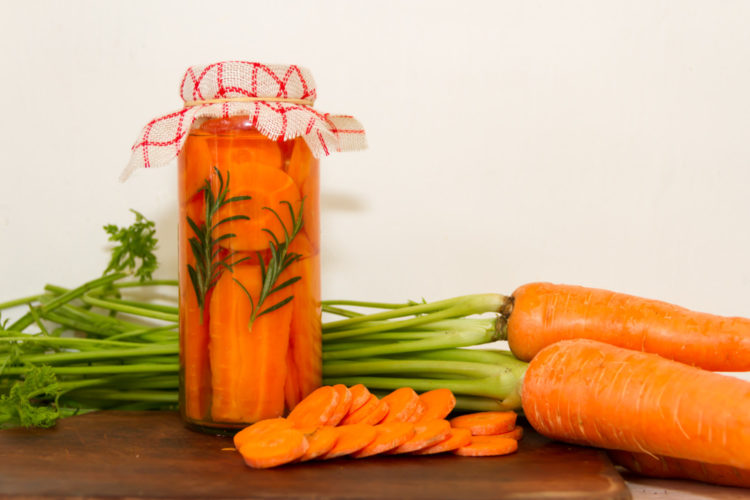
Other Carrot Tips
There are a few other tips to know when cooking, preserving or eating carrots, whether you opt to peel them or not.
- Peeled carrots sometimes develop a dry, white coating when stored for any length of time. However, you can soak them in cold water for a while to rehydrate and restore their color.
- Cooking carrots brings out their natural sweetness.
- Cut carrot slices the same size for even cooking.
- Slice them diagonally to expose more surface area so they will cook more quickly.
- If you do peel your carrots, avoid dumping the peels down the garbage disposal, as they could cause a clog. Instead, toss them in the trash or, better yet, add them to your compost.
This story originally appeared on Simplemost. Checkout Simplemost for additional stories.


